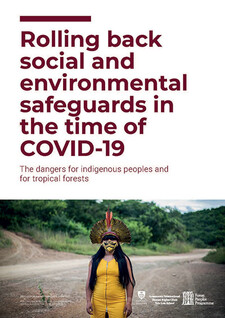New Report Details COVID-Related Threats to Indigenous Peoples and Environment
The Lowenstein International Human Rights Clinic at Yale Law School and the Forest Peoples Programme (FPP), based in the United Kingdom, released a report, Rolling Back Social and Environmental Safeguards in the Time of COVID-19, on February 18, 2021. The report documents the erosion of Indigenous Peoples’ rights, damage to forest environments, and violence resulting from government responses to the COVID-19 pandemic and the ensuing global recession.
The new report, based in part on interviews with affected communities, focuses on the world’s five most forested countries, Brazil, Colombia, the Democratic Republic of the Congo (DRC), Indonesia, and Peru. The Lowenstein Clinic and FPP collaborated with Indigenous Peoples’ organizations in the five countries studied and with the Middlesex University Law Faculty on the global report, as well as on five country-specific reports.

In their quest to bolster economies battered by the pandemic, governments in Brazil, Colombia, the DRC, Indonesia, and Peru have set aside social and environmental safeguards in favor of destructive development projects that are harming Indigenous communities and the forests they care for, according to the report. At the same time, private actors have entered Indigenous territories to engage in resource exploitation. Governments have allowed these land grabs to occur with impunity, according to the report.
Open-pit mines, industrial agriculture plantations, infrastructure mega-schemes and hydropower complexes are among the projects fueling a rise in human rights abuses and deforestation in the five countries that contain the majority of the world’s tropical forests.
“This research proves beyond question that the behavior of governments and commodity producers in these five countries conflicts directly with growing demand in consumer nations for supply chains that are free of human rights abuses, deforestation and biodiversity loss,” said Dr. Myrna Cunningham, President of the Fund for the Development of the Indigenous Peoples of Latin America and the Caribbean (FILAC), speaker at a press briefing for the report’s release.
“Now we must ask, how will the global community respond to these findings? During the pandemic, governments have not only failed to stop land grabs and human rights violations by corporate actors, but have rewritten and reversed hard-won policies that are vital to any strategy aimed at protecting human rights and stopping the destruction of priceless ecosystems,” Cunningham said.
“Given the ongoing pandemic, many Indigenous leaders around the world have demanded that their governments refrain from passing new legislation or initiating extraction or other development projects that affect Indigenous lands until the risk of infection has waned and it is once again possible to obtain free, prior, and informed consent from Indigenous communities,” said Chris Ewell ’22, a member of the Lowenstein Clinic.
“The governments present COVID-19 rules as an exception, but these exceptions merely roll things back to business as usual,” said Anna Wherry ’21, a member of the Lowenstein Clinic team that drafted the report. “The COVID-19 pandemic has enabled these governments to look past Indigenous rights with impunity.”
“It is wrong to prioritize economic development over the protection of Indigenous Peoples’ rights and tropical forests, especially during a pandemic,” said James Whitehead, director of Forest Peoples Programme (FPP). “In 2021, two big international conferences will address climate change and the frightening loss of biodiversity globally. This study provides yet more evidence that the international community and businesses need to urgently maintain and strengthen protections for human rights and tropical forests and proactively support Indigenous Peoples to secure and protect their territories.”
“The pandemic can never be an excuse to trample upon human rights and destroy our planet,” said Joan Carling, director of Indigenous Peoples Rights International. “Rolling back environmental and social protections in the name of promoting economic recovery is adding insult to injury for Indigenous Peoples.”
The report sets out the urgent actions that are needed by the governments of tropically forested countries to reverse these dangerous rollbacks and strengthen protections for Indigenous Peoples and their territories. It calls for the stronger regulation of global supply chains linked to rights abuse and deforestation and urges international investors and financial institutions to apply rigorous safeguards to respect human rights and protect forests in all financing for COVID-19 recovery projects and programs.
The Allard K. Lowenstein International Human Rights Law Clinic is a legal clinic at Yale Law School that undertakes projects on behalf of human rights organizations and individual victims of human rights abuses.


